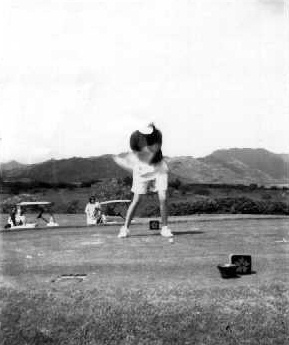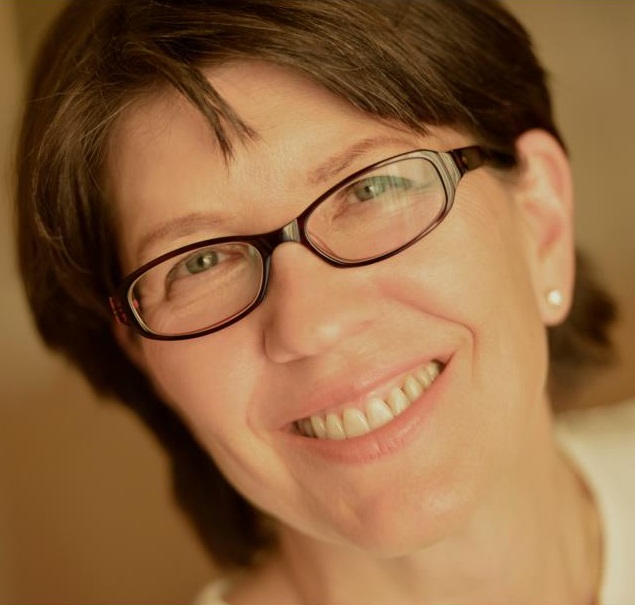 | Elizabeth on the tee.
Photograph ©Dave Krieger |
interview
with Elizabeth Sims
Elizabeth answers questions about Damn Straight, the second novel in the Lillian Byrd Crime Series.
|
Most of the action in Damn Straight happens at the Dinah Shore golf championship in the California desert. Why the Dinah?
Well, the Dinah Shore Invitational Championship is to women's athletics what the Michigan Festival is to women's music. You know, all you have to say is, "Michigan," and gay women know what you're talking about. It's the same with "The Dinah." The tournament isn't even officially called the Dinah anymore, it's called the Kraft Nabisco, which is sad, but people still call it the Dinah. For decades it's had a real mystique: it's the top championship in women's golf, therefore all the top players are there, therefore they'd all give almost anything to win it. So there's an atmosphere of suspense built right in. If you've ever gone to watch, there's a thrill in the air that you just don't feel anywhere else.
So the Dinah is very important, and I wanted to write a novel set there for a few reasons. One is that I wanted to pay tribute to it. Tribute to its history, to the great golfers who've played in it.
Two, it's this huge lesbian jamboree. Women from all over America—all over the world, even—come to root for their faves and party down. The big hotels throw these massive parties where women get together and dance and drink and have a great time. Some come only for the parties. Last year during tournament week I was talking to a young woman in a hotel lobby. I asked her whether she was going to get out to watch the golf today. She gave me a blank look and said, "There's golf?"
Three, nobody's written about the Dinah this way. I mean, there are all these lesbian mystery fans out there, and tons of amateur golfers who happen to be gay women, and nobody I know of has set a suspense story at the Dinah. There's one murder mystery set at a women's golf tournament in a foreign country, but it's not at all like the Dinah, and the golf hardly enters into the story.
So, do you know a three-iron from a bunker rake?
I do. In writing this story I saw an opportunity to make use of my knowledge of golf.
Make use of, or show off?
Come now, it's too early in the interview for a question like that. I tried to really weave the actual game into the story. My main character, Lillian Byrd, describes watching—really closely watching—champions practicing and playing. She understands the strategy of the game, and she understands the physics of the golf swing. Being Lillian, however, she's not such a great golfer herself.
In addition, I did research to make sure I got the details of the tournament right. That consisted basically of walking around the tournament, looking and listening and sniffing and making notes and talking to people. If you pay attention, you notice who's following which golfers. You can eavesdrop on what they're saying and you can figure out stuff.
For instance?
For instance there were a couple of women following one star golfer. And they looked extremely serious, like they were way inside the sport. I sidled over and heard them talking about whether one of them should accept a job she'd just been offered: head coach of an international golf team. Another time I saw this group of course marshals exchanging dollar bills and candy bars at the end of the day, and I realized they were settling bets. So I asked them what they'd been betting on. They said they bet every year on the scoring at the 17th hole, a tough par 3.
Will non-golfers be able to relate to the story?
Well, my editor doesn't golf and she loved it. I made an effort not to overdo the golf details. I might note that it's possible to appreciate a game even if you don't play it. I don't play football but I like to watch it. And I like to listen to knowledgeable people talk about it.
In Holy Hell, you established Lillian Byrd as a bit of a goof. That is, someone who isn't very sophisticated. What was it like putting her into a glitzy environment?
Oh, it was so much fun. The thing is, Lillian may not be sophisticated, but she's alive, she appreciates beauty, she appreciates sex, she appreciates good things. I mean, a world-class athlete is an awesome physical being, no matter whether she's someone sort of sleek like Annika Sorenstam, or someone fairly burly like Laura Davies. They're so healthy, so beautiful and competent. The body awareness they have is incomparable. Lillian gets into that sort of stuff.
And I realized that by setting the story in a glitzy milieu, I could use Lillian to explore so much: lust, money, fame, achievement, social conflict, obsession. And I did, and it was fun.
Moreover, while Damn Straight mostly takes place at a big-money international event, it's a story about people. Lillian gets into trouble, of course—she's so good at that. She gets hit on by a big LPGA star, and she falls for her, and from then on she's a captive of her own emotions. Her emotions lead her to make certain choices. See, the golfer Lillian falls in love with has a secret she wants to keep hidden. And she's in danger. Lillian perceives that if she can make the danger go away, she'll be a hero to her love. And the more she works on it, the more she understands that the danger is rooted in that gorgeous golfer's past. The golfer doesn't want her to go there. But Lillian loves her and wants to protect her. So what's she going to do?
Well?
[Laughs.] One thing she does is, she resorts to pretending to be other people to get to the bottom of the story. At one point she impersonates a reporter from Sports Illustrated, then she's a psycho nun who ingratiates herself with an abortion-clinic bomber. And then, of course, I had to get her inside the ropes at the tournament. She winds up caddieing for her heartthrob.
I don't know why, but one of my favorite parts is where Lillian goes to a Salvation Army store to outfit herself as this plainclothes nun. It's hard to explain, but I just really enjoyed letting her shop around the thrift racks. Lillian will never be glam, you know. She's never had much money, and never any position to speak of, and she gets a bit dazzled by the glitz. But being more or less from the streets, she is at the same time somewhat cynical about the glitz.
There's quite a subplot involving Lillian's best friend, Truby. Does Truby happen to be based on a real person?
Yes and no. My real best friend shares some characteristics of Truby, just as I share some characteristics of Lillian. But the Truby subplot is something I came up with in order to really put Lillian in dire straits: her friend is in crisis, her friend needs her, yet while holding this friend's hand, Lillian dives right into a completely separate situation, a terribly dangerous one, that taxes her resources to the utmost. This is along the lines of "Put your hero up a tree and throw stones at her." Well, I wanted to throw a lot of stones at Lillian in this book. Truby's troubles are just one more barrage.
Lesbians in the LPGA: a big deal, or not?
Back to sex, huh? Some snotty TV commentator once said publicly that lesbians in the LPGA hurt women's golf. And a European female champion publicly agreed with him. I totally hate her for that and won't even say her name. But the truth is, of course, that prejudice against lesbians hurts women's golf. That's all there is to it. Moreover, being a lesbian athlete is certainly not as big a deal as it used to be, thanks to women who've come out, like Patty Sheehan, and, um, I'm trying to think of more.
Will fans of Lillian's rabbit, Todd, be gratified by Damn Straight?
I fervently hope so. I gave Todd a larger role in this story. He and Lillian save each other's lives, more or less, plus Todd plays a pivotal role in a cataclysmic event near the end.
The humor in your books is fairly understated, and it's aimed in unexpected directions. Would you go so far as to call it subversive?
I guess my books could best be described as deadpan comic noir. The humor of my stuff is a slippery thing. What's funny about it can't really be explained. It's sort of like, if you have to ask "In what way is this funny?" you're never going to know.
I wouldn't have thought to use the word subversive, but it makes me feel special, so yes, I'd call my humor subversive. I like to get people to laugh at things they formerly took totally seriously.
For example?
For example I'm proud of Lillian's obsession with reading a series of cheesy crime stories, featuring a heroine named Calico Jones. She's ashamed of liking these sexy, melodramatic, cliché-ridden stories, but she can't put them down. And she can never remember the author's name. I make myself laugh every time I think of that. I'm very proud of that.
Would you comment on Lillian's personal development during the story?
Starting in Holy Hell, I wanted to build a character who was flawed but lovable. I've been advised by readers to make Lillian settle down into a monogamous relationship, which must mean they feel that would be a more mature way of life. But I have a feeling Lillian's luck isn't quite good enough to swing that. We'll see, I guess.
I feel that Lillian learns more about life in Damn Straight—she sees what woefully deep graves we can dig for ourselves if we don't watch it. She falls in love, she takes risks. She takes even greater risks in this book than in Holy Hell, although she doesn't get shot in this one. Some of the risks pay off, some don't. She accepts this.
And you?
Well, I certainly have developed as a writer. I'm incredibly glad to be able to say that. Damn Straight is a better book than the very nearly perfect Holy Hell, and that's because I got better at turning off my internal editor, that horrible little bitch inside my head. I got better at letting the story flow where it wanted to go, and I got better at judging what works and what doesn't. If I keep improving as a writer, and if I live long enough, I'll make it big someday. Just you wait and see.
..
Read on!
|



